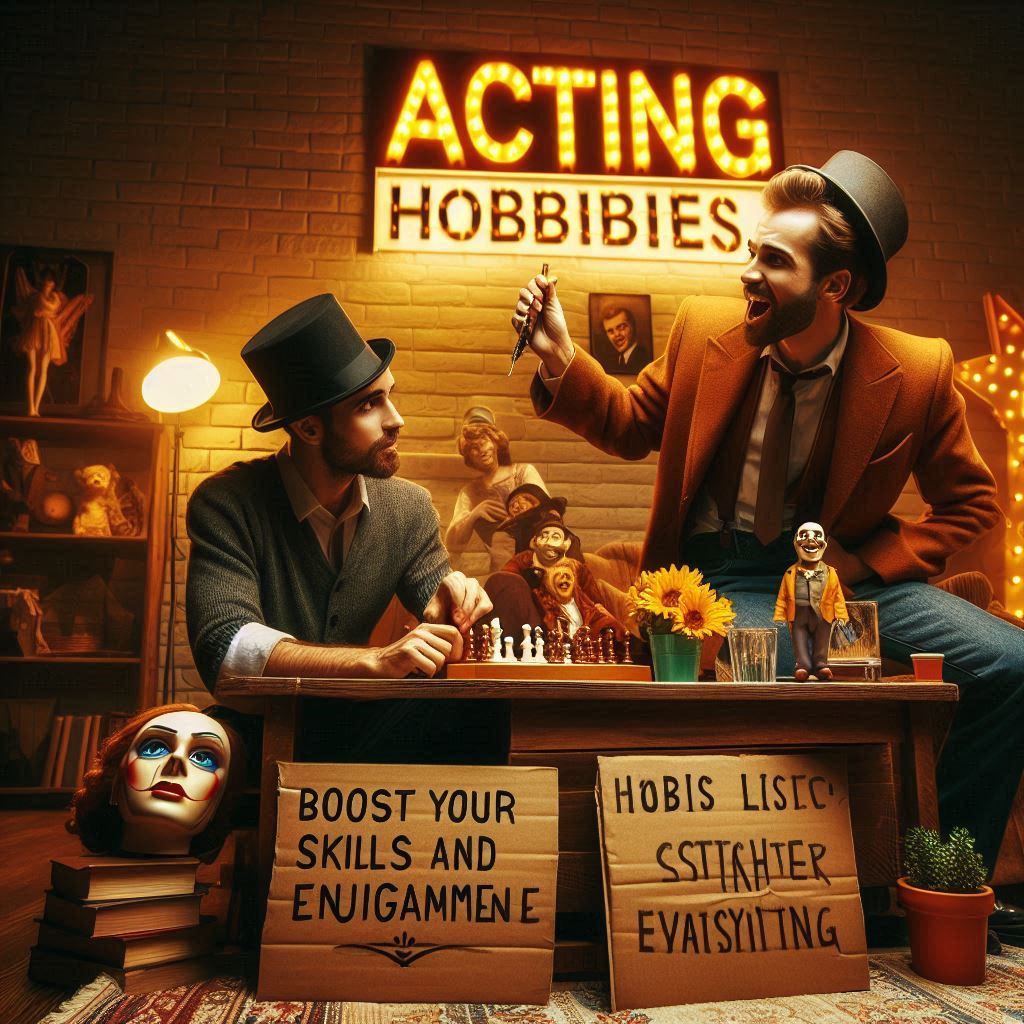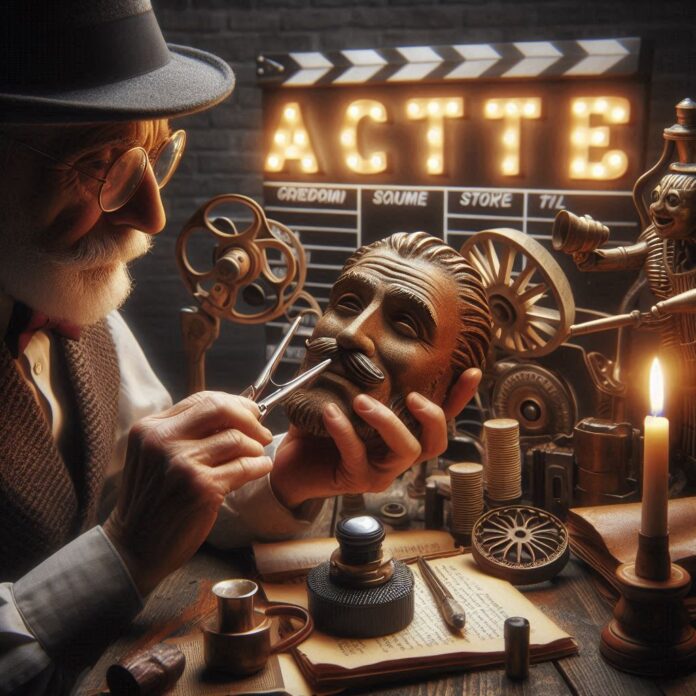Discover 12 engaging acting hobbies that can enhance your skills, boost your creativity, and provide endless enjoyment. Explore activities from improv to stage combat that will transform your acting career.
Introduction
Acting is an art that requires a diverse skill set, creativity, and continuous improvement. Engaging in various hobbies can significantly enhance your acting abilities and provide new avenues for expression. Here are 12 exciting hobbies that can boost your skills and bring more enjoyment to your acting journey.
Table of Contents
| Headings | Sub-Topics |
|---|---|
| 1. Introduction to Acting Hobbies | Importance of Hobbies for Actors |
| How Hobbies Enhance Acting Skills | |
| 2. Improv Comedy | Benefits of Improv for Actors |
| Tips for Getting Started | |
| 3. Stage Combat | Importance of Stage Combat Training |
| Basic Techniques and Safety Measures | |
| 4. Voice Acting | Developing Vocal Range and Flexibility |
| Voice Acting Exercises | |
| 5. Dance | How Dance Improves Physicality and Expression |
| Different Styles of Dance | |
| 6. Singing | Enhancing Vocal Control and Emotion |
| Types of Singing Techniques | |
| 7. Script Writing | Understanding Storytelling and Character Development |
| Tips for Writing Your Own Scripts | |
| 8. Photography | Learning to See from Different Perspectives |
| Basic Photography Techniques | |
| 9. Yoga and Meditation | Benefits for Mind-Body Connection |
| Techniques for Actors | |
| 10. Painting and Drawing | Boosting Creativity and Observation Skills |
| Tips for Getting Started | |
| 11. Historical Reenactment | Gaining Insight into Different Eras and Characters |
| Joining Reenactment Groups | |
| 12. Stand-Up Comedy | Improving Timing and Audience Interaction |
| Writing and Performing Stand-Up | |
| 13. Magic and Illusion | Enhancing Stage Presence and Audience Engagement |
| Basic Tricks and Techniques | |
| 14. Podcasting | Developing Voice and Interview Skills |
| Starting Your Own Podcast | |
| 15. Public Speaking | Building Confidence and Clarity |
| Techniques to Engage an Audience | |
| 16. Learning a Musical Instrument | Enhancing Rhythm and Coordination |
| Choosing the Right Instrument | |
| 17. Martial Arts | Improving Discipline and Physicality |
| Popular Martial Arts for Actors | |
| 18. Puppetry | Developing Hand-Eye Coordination and Character Creation |
| Types of Puppetry | |
| 19. Mime and Physical Theatre | Enhancing Non-Verbal Communication Skills |
| Techniques and Exercises | |
| 20. Accents and Dialects | Expanding Your Vocal Range |
| Resources for Learning Accents | |
| 21. Cooking and Baking | Enhancing Patience and Creativity |
| Cooking for Stress Relief | |
| 22. Social Media and Blogging | Building Your Personal Brand |
| Tips for Engaging Content | |
| 23. Traveling | Gaining New Experiences and Inspirations |
| Tips for Travel Planning | |
| 24. Animal Training | Developing Patience and Communication Skills |
| Basics of Animal Training | |
| 25. Conclusion | Recap of Hobbies and Their Benefits |
| Encouragement to Explore New Hobbies |
1. Introduction to Acting Hobbies
Importance of Hobbies for Actors
Hobbies are not just pastimes; they are essential for personal growth and professional development, especially for actors. Engaging in various activities allows actors to acquire new skills, explore different perspectives, and gain experiences that can be invaluable on stage or screen.
How Hobbies Enhance Acting Skills
Each hobby offers unique benefits that can translate into improved acting abilities. Whether it’s developing physicality through dance, improving vocal control with singing, or learning new character perspectives through historical reenactment, hobbies can provide a rich resource for an actor’s toolkit.

2. Improv Comedy
Benefits of Improv for Actors
Improv comedy is an excellent way for actors to enhance their spontaneity, quick thinking, and ability to stay in the moment. It fosters creativity, builds confidence, and sharpens listening skills, all of which are crucial for effective acting.
Tips for Getting Started
To start with improv, join a local improv group or take classes at a community theater. Practice regularly, participate in workshops, and don’t be afraid to take risks on stage. Remember, the key to improv is to say “yes, and…” to keep the scene flowing.
3. Stage Combat
Importance of Stage Combat Training
Stage combat is essential for actors, particularly those interested in action roles or period dramas. It involves choreographed sequences that mimic real fights while ensuring the safety of the performers.
Basic Techniques and Safety Measures
Begin with basic techniques like punches, kicks, and falls. Always practice under the supervision of a trained instructor to ensure safety. Learning the principles of distance, timing, and control is crucial to perform realistic yet safe combat scenes.
4. Voice Acting
Developing Vocal Range and Flexibility
Voice acting requires a diverse vocal range and the ability to adapt your voice for different characters and scenarios. It enhances your overall vocal control and flexibility, which is beneficial for both on-screen and stage performances.
Voice Acting Exercises
Practice tongue twisters, breathing exercises, and mimic different voices and accents. Record your voice to identify areas for improvement and experiment with different tones and pitches to expand your vocal abilities.
5. Dance
How Dance Improves Physicality and Expression
Dance helps actors improve their physical presence, coordination, and ability to express emotions through body language. It enhances overall fitness and flexibility, which are vital for demanding roles.
Different Styles of Dance
Explore various dance styles such as ballet, contemporary, hip-hop, and ballroom. Each style offers unique benefits and can be incorporated into your acting repertoire. Consider taking classes or joining a dance group to refine your skills.
6. Singing
Enhancing Vocal Control and Emotion
Singing helps actors develop vocal control, pitch, and emotional expression. It also improves breath control and can be a powerful tool for conveying emotion in performances.
Types of Singing Techniques
Learn different singing techniques like belting, falsetto, and vibrato. Practice regularly with vocal exercises and consider taking lessons to improve your skills and maintain vocal health.
7. Script Writing
Understanding Storytelling and Character Development
Scriptwriting allows actors to understand the intricacies of storytelling and character development. It provides insight into the writer’s perspective, which can enhance your performance as an actor.
Tips for Writing Your Own Scripts
Start by writing short scenes or monologues. Focus on creating compelling characters and realistic dialogue. Reading scripts from various genres can also provide inspiration and help you develop your writing style.
8. Photography
Learning to See from Different Perspectives
Photography teaches actors to observe the world from different angles and perspectives. It enhances attention to detail and composition, which can be applied to scene analysis and character study.
Basic Photography Techniques
Learn the basics of lighting, framing, and composition. Experiment with different subjects and styles, and use photography as a way to explore and capture emotions and stories visually.
9. Yoga and Meditation
Benefits for Mind-Body Connection
Yoga and meditation promote a strong mind-body connection, which is essential for actors. They help reduce stress, improve focus, and enhance overall well-being, leading to more grounded and centered performances.
Techniques for Actors
Incorporate yoga poses that improve flexibility and strength, such as warrior poses and forward bends. Practice mindfulness meditation to increase mental clarity and emotional resilience.

10. Painting and Drawing
Boosting Creativity and Observation Skills
Engaging in painting and drawing enhances creativity and improves observational skills. It encourages a deeper understanding of color, form, and texture, which can be translated into more vivid and detailed character portrayals.
Tips for Getting Started
Start with basic drawing exercises and gradually explore different mediums such as watercolors, oils, or charcoal. Attend art classes or follow online tutorials to develop your skills and find your unique artistic voice.
11. Historical Reenactment
Gaining Insight into Different Eras and Characters
Historical reenactment allows actors to immerse themselves in different time periods and cultures. It provides a rich context for understanding historical characters and events, enhancing the authenticity of period performances.
Joining Reenactment Groups
Research local reenactment groups or historical societies. Participate in events and performances to gain hands-on experience and collaborate with other enthusiasts. This can provide valuable insights and inspiration for your acting roles.
12. Stand-Up Comedy
Improving Timing and Audience Interaction
Stand-up comedy sharpens an actor’s timing, wit, and ability to engage with an audience. It builds confidence and helps develop a unique comedic voice, which can be beneficial for both comedic and dramatic roles.
Writing and Performing Stand-Up
Write your own material, focusing on personal experiences and observations. Perform at open mic nights or comedy clubs to gain experience and receive feedback. Practice regularly to refine your delivery and stage presence.
13. Magic and Illusion
Enhancing Stage Presence and Audience Engagement
Magic and illusion require precise timing, dexterity, and the ability to captivate an audience. These skills can enhance an actor’s stage presence and ability to hold the audience’s attention.
Basic Tricks and Techniques
Learn basic magic tricks, such as card tricks or sleight of hand. Practice regularly and consider joining a magic club or taking lessons to improve your skills and add a unique element to your performances.
14. Podcasting
Developing Voice and Interview Skills
Podcasting helps actors develop their voice and interviewing skills. It’s an excellent way to practice articulation, storytelling, and engaging with an audience through audio alone.
Starting Your Own Podcast
Choose a topic you’re passionate about and plan your episodes. Invest in good-quality recording equipment and editing software. Promote your podcast through social media and networking to build an audience.
15. Public Speaking
Building Confidence and Clarity
Public speaking is essential for actors to build confidence and clarity in their speech. It enhances the ability to convey messages effectively and engage with an audience.
Techniques to Engage an Audience
Practice speaking clearly and confidently in front of groups. Use techniques like eye contact, vocal variety, and body language to keep the audience engaged. Join public speaking clubs such as Toastmasters to gain more experience and receive constructive feedback.
16. Learning a Musical Instrument
Enhancing Rhythm and Coordination
Learning a musical instrument improves rhythm, coordination, and concentration. These skills are beneficial for actors in musical theatre or roles that require precise timing and physicality.
Choosing the Right Instrument
Choose an instrument that interests you and fits your lifestyle. Common choices for actors include piano, guitar, and violin. Take lessons and practice regularly to develop your musical skills and enjoy the process of learning.
17. Martial Arts
Improving Discipline and Physicality
Martial arts training enhances discipline, physical fitness, and mental focus. It’s particularly useful for actors involved in action roles or those seeking to improve their overall stage presence.
Popular Martial Arts for Actors
Explore martial arts such as karate, taekwondo, or Brazilian jiu-jitsu. Each discipline offers unique benefits and can be tailored to your physical abilities and interests. Regular training helps build strength, agility, and confidence.
18. Puppetry
Developing Hand-Eye Coordination and Character Creation
Puppetry involves manipulating puppets to create lifelike characters, enhancing hand-eye coordination and creativity. It’s a unique way to explore character development and storytelling.
Types of Puppetry
Explore different types of puppetry, such as marionettes, hand puppets, and shadow puppets. Each style offers unique challenges and opportunities for creative expression. Consider taking puppetry workshops to learn basic techniques and performance skills.
19. Mime and Physical Theatre
Enhancing Non-Verbal Communication Skills
Mime and physical theatre focus on expressing emotions and stories through body movements without the use of words. This enhances an actor’s ability to communicate non-verbally and improve physical expressiveness.
Techniques and Exercises
Practice mime exercises such as the imaginary box or rope pulling. Study physical theatre techniques like those developed by Jacques Lecoq or the Suzuki method. Regular practice will improve your ability to convey complex emotions and narratives physically.
20. Accents and Dialects
Expanding Your Vocal Range
Learning different accents and dialects expands an actor’s vocal range and versatility. It allows for more authentic portrayals of characters from diverse backgrounds.
Resources for Learning Accents
Use online resources, dialect coaches, or language apps to learn new accents. Practice regularly and record yourself to monitor progress. Engage in conversations with native speakers to refine your pronunciation and intonation.
21. Cooking and Baking
Enhancing Patience and Creativity
Cooking and baking require patience, creativity, and attention to detail. These qualities can be beneficial for actors in managing stress and staying focused on their craft.
Cooking for Stress Relief
Explore different recipes and cooking techniques. Cooking can be a therapeutic activity that helps you relax and unwind. Share your culinary creations with friends and family to build connections and receive feedback.
22. Social Media and Blogging
Building Your Personal Brand
Social media and blogging are powerful tools for actors to build their personal brand and connect with audiences. They allow you to showcase your work, share insights, and engage with fans and industry professionals.
Tips for Engaging Content
Create consistent, high-quality content that reflects your personality and interests. Use a mix of photos, videos, and written posts to keep your audience engaged. Interact with your followers and participate in online communities related to acting.
23. Traveling
Gaining New Experiences and Inspirations
Traveling exposes actors to new cultures, environments, and experiences, providing a wealth of inspiration for character development and storytelling. It broadens your perspective and enhances your ability to portray diverse characters authentically.
Plan your trips to include a mix of relaxation and exploration. Visit places that interest you and keep a travel journal to document your experiences.
